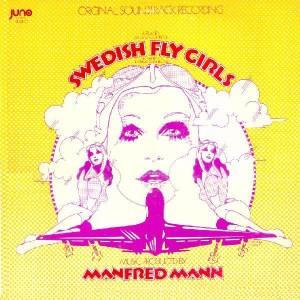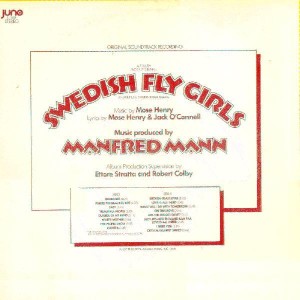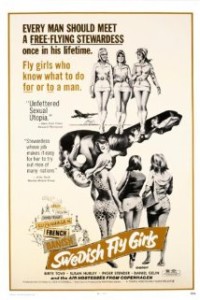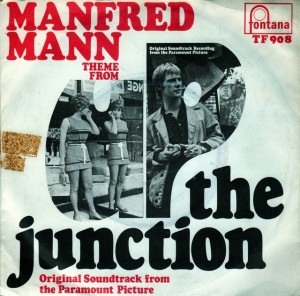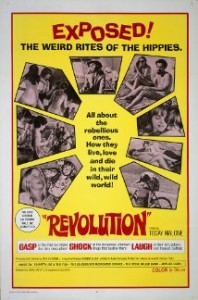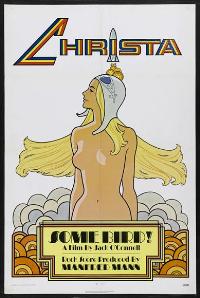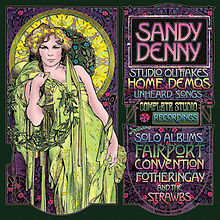Sandy Denny and…Swedish fly girls. Whatever Swedish fly girls are, the two things don’t seem to go together, do they? But they did, when Denny sang four songs in 1969 or 1970 for an obscure Danish (not Swedish; more on that weirdness later) film titled, for some (but not all) markets, Swedish Fly Girls. It’s an absurd juxtaposition that you couldn’t make up.
Ever since first hearing those four tracks on a bootleg that was itself so obscure it never made it past the CDR stage, I’ve wondered how Sandy ended up participating in this odd project. (I know listening to bootlegs is not the officially approved way to hear things like this, but I never would have even found out they existed if not for that unauthorized disc!) I haven’t found out how she ended up on the soundtrack, exactly, but hearing the four songs in better fidelity than that bootleg on the recent 19-CD (!) Denny box set stoked my interest again. Enough that I even saw the film earlier this month, though it hasn’t been officially issued on DVD. No, the copy I viewed wasn’t authorized. But in the absence of official product, how else are you going to carry out this vital historical research?
First, a basic scenario, especially for those not familiar with the songs: the Swedish Fly Girls soundtrack LP (and there is an actual soundtrack LP) has four tracks sung by Sandy Denny—“Water Mother,” “What Will I Do With Tomorrow,” “Are the Judges Sane?,” and “I Need You” (the last of which also has vocals by a male singer, one Mose Henry). These are poppier and rather unlike anything else she recorded in the 1960s and early 1970s. They have a lightly orchestrated (with flute and strings), almost dreamily pseudo-cinematic feel, unsurprisingly so given their purpose as rather incidental music in what verged on a soft porn film (more details soon). If there’s any participation from her bands of the time, Fairport Convention and Fotheringay, it’s not evident.
“Water Mother” and “What Will I Do With Tomorrow” are actually rather nice wistful pop-folk ballads. The tenser, more somber “Are the Judges Sane?” ends in a dizzying swirl of strings, and has some fairly faintly mixed but burning blues-hard-rock guitar somewhere in the background, which I’m guessing is likely the work of a seasoned London session axeman. Allan Holdsworth, perhaps? Eric Ford? Big Jim Sullivan? Maybe even a big name like Jeff Beck moonlighting for some quick cash between tours? (All theories gratefully received at this address.) “I Need You” is perhaps the least characteristic thing Denny put on vinyl back then, being something of a fruitily orchestrated country-pop feel-good ditty where the greatest British folk-rock singer shares vocals with the decidedly colorless Mose Henry.
Why did Denny deign to lend her pipes (anonymously, even; again, more on that in a bit) to such a left-field endeavor? Well, getting Melody Maker accolades didn’t necessarily translate to a large bank balance, and a number of respected British artists took on what some might consider hack work to help pay the bills. There were all those soundalike covers of hits that Elton John helped crank out, for instance, or the Pretty Things cutting film library music on the Electric Banana LPs (and agreeing to back amateur singer Philippe DeBarge when the well-heeled Frenchman paid them for the privilege). It wasn’t even the only instance in which Denny lowered herself to such sidelines, as she also sang on a butter commercial in the late ‘60s.
Digging around online, I found a fairly detailed recollection (dating from 2002) of the soundtrack recording from Mose Henry (who died in 2010), at http://sandydennylist.blogspot.com/2009/12/swedish-fly-girls.html. It’s fairly interesting, if a bit overblown, but lengthy, so I’ll just post the most essential excerpt here:
I was in London for 12 weeks the spring and summer of 1970. Manfred Mann and I co-produced the music for “Christa.” The rhythm section was the band who did the London Production of “Hair” and we used London Philharmonic strings and brass. At times a 30-piece rock orchestra for the film. I wrote all of the music, Derek Wadsworth arranged it Manfred # 1 Producer I was associate producer without credits. I sang “I Need You” with Sandy. Sandy was ill and after she saw the lead sheets of the music she came to the studio to record it anyway. She told me “What Will I Do With Tomorrow” was the most beautiful song she had ever heard. In my book she sang it like an angel. When she sang the final take for that recording the entire studio was lifted to another place and time words cannot describe. The recording said it well enough.
Although some sources date Sandy’s tracks as having been recorded in mid-1969, here Henry’s clear in his assertion that the work was done in spring and summer 1970, when Denny was in Fotheringay (a timeline also supported by the best Denny biography to date, Clinton Heylin’s No More Sad Refrains). As for Denny telling Henry “What Will I Do With Tomorrow” (for which Henry got a co-songwriting credit with an unlikely partner—more details soon!) “was the most beautiful song she had ever heard,” I suspect she was just being nice to him. This from the woman who’d recorded such memorable songs as “She Moves Through the Fair,” “Tam Lin,” Joni Mitchell’s “Eastern Rain,” Bob Dylan’s “Percy’s Song,” and Dave Cousins’s “And You Need Me”? Not to mention her own “Fotheringay,” “Who Knows Where the Time Goes,” and “Autopsy,” though she would likely have been too modest to cite her own compositions?
Read some more in that lengthy Henry post, and you’ll find out that he’d been in the whitebread US folk group the Highwaymen, though long after (his stint spanning 1964-68) their 1961 US chart-topper “Michael” (aka “Michael Row the Boat Ashore”). What’s more interesting, however, is that, as the excerpt above notes in passing, he co-produced the soundtrack with Manfred Mann. Mann, of course, already had significant experience in film scores, his group having done the generally decent, acclaimed music (some with vocals) to the Swinging London-set 1968 kitchen-sinkish drama Up the Junction.
Now the plot gets yet more interesting — more interesting than the plot in the film that generated the Swedish Fly Girls soundtrack, certainly. There was an actual Swedish Fly Girls soundtrack LP that came out in the US in May 1972, with music by, among others, Melanie (one of her better-known songs, “Beautiful People”) and Manfred Mann himself/themselves. Weirdly, the performers were uncredited, accounting for why Denny’s contributions remained virtually unknown for so many years, though it’s immediately obvious that it’s her as soon as she opens her mouth on each of the four tunes. All four of which, incidentally, bear the songwriting credits of Mose Henry and…Jack O’Connell. Who was Jack O’Connell?
Well — and what an extraordinary coincidence! — he was the director of Swedish Fly Girls (and, for that matter, also its producer and writer). I’m not aware of any other musical credentials to his name, but shortly before taking on the film, he’d been involved with a movie that will likely be much more familiar to ‘60s rock fans. For he was also producer-director of the rather infamous 1968 quasi-documentary Revolution, which purported to capture the 1967 Haight-Ashbury scene, but verged on hippie exploitation. At least that movie had an interesting soundtrack, including tracks by top Bay Area acts Quicksilver Messenger Service, the Steve Miller Band, and Mother Earth that are not found on their regular LPs (and, on top of that, some versions of songs on the album by those artists that are heard in the movie itself, but not included on the record).
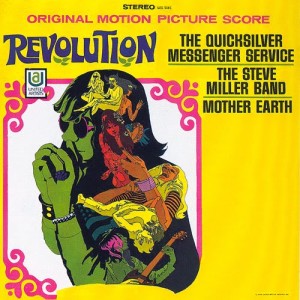
The soundtrack to the 1968 film Revolution had rare tracks by Quicksilver Messenger Service, the Steve Miller Band, and Mother Earth.
The actual Revolution film was less impressive. Here’s what some of the people involved on the musical side told me when I interviewed them for a story on rare San Francisco psych LPs in the April 2013 issue of Record Collector:
Powell St. John of Mother Earth: “As for the movie, one thing that [Mother Earth singer] Tracy [Nelson] insisted upon was that there was no sensationalism, and no exploitation of the so-called ‘hippie phenomenon,’ no lurid details of naked orgies or other such nonsense. I think we were all of one mind about that. The film people assured us they were good guys and would never do anything so crass as to produce an exploitation flick so we took them at their word. Well if you’ve ever seen the posters for that film you know that exploitation is exactly the right word for it. So, needless to say we were not pleased with the results.”
Mother Earth manager Travis Rivers: “The film was such a disaster it showed only in pornographic movie houses for at least two decades. My impression was not enhanced when I ran into a local who told me she would be starring in the ‘documentary’ and that Jack had changed her name to ‘Today Malone.’” Rivers also said O’Connell gave Allen Cohen, editor of leading local underground paper The San Francisco Oracle, “money on the side to set up that awful fake be-in” near the start of the movie.
Steve Miller Band manager Harvey Kornspan: “The movie itself was a cartoon. I doubt that it cost more than a hundred grand to make at the time. Malone was pretty in a soft hippie girl kind of way, but she had no acting chops. None!” he laughed. “The director was kind of an opportunist sleazy cat.”
How do you follow an act like that? Well, you make your next film in Denmark, apparently because Revolution had done well there. Interestingly, the score to Swedish Fly Girls was originally handled by Al Kooper, but ended up being taken on by Manfred Mann. A couple websites hint at dark undercurrents to the transition, one noting that “he was replaced by Manfred Mann, reportedly because of artistic and financial difficulties.” As the film is not even mentioned in Kooper’s quite substantial and entertaining memoir Backstage Passes & Backstabbing Bastards, it might not have meant that much to him in the first place.
And what of the film itself? Like many such things, actually watching the thing is something of an anti-climactic letdown, especially considering all the intriguing connections and credible rock musicians who were (or almost were) associated with the soundtrack. First issued as Christa in 1971, it follows the serial affairs of a young Danish (not Swedish, despite what its subsequent retitling would lead you to believe) flight attendant. There’s much casual sex, and a fair amount of nudity, though not so much that you could say it’s a skin flick. Christa, and most of her lovers, have a guilt-free zest for intercourse that screams 1969, as do her and her American housemate’s dresses and the mod decor of her Copenhagen residence. Her suitors have a rather oily Eurotrash vibe, though the hippest of them looks kind of like David Essex. Fortunately (especially considering the bootleg DVD doesn’t have English subtitles), over half of the dialogue is in English, most of her lovers being passengers she takes a shine to on her globetrotting flights. Truth be told, it wouldn’t be all that hard to follow the “action” even if all the talk was unsubtitled Danish.
It’s hard to believe, as one reviewer wrote, that the original running time was close to four hours; 100 minutes is quite enough. As for the soundtrack, it can’t seem to decide whether to be period cinematic pop or pop-rock, something true (in a different way) of Manfred Mann’s contributions as well as Sandy Denny’s. And it’s a good thing the soundtrack LP came out, since you only hear brief snippets of Sandy’s songs in the actual film.
I haven’t heard the original soundtrack album (or even seen an actual copy), which must have been scarce even in the early 1970s. As for why it was retitled Swedish Fly Girls, one can only guess that Swedish stewardesses were deemed a more commercial proposition than Danish ones, and in English-speaking markets, who was going to be able to tell the main character was speaking Danish, not Swedish, anyway?
In the extensive 2002 message from Mose Henry posted on the http://sandydennylist.blogspot.com/2009/12/swedish-fly-girls.html site, by the way, he makes this outrageous claim: “Almost every movie since then has been modeled on “Christa” it was the first film edited to the beat of the music and other film makers are using a lot more music in their soundtracks. We were the first to edit to the beat of the music with “Christa.” What? A Hard Day’s Night doesn’t count?
Surprisingly considering the film’s modest merits (and states of undress), the film was actually reviewed in the New York Times on August 21, 1971. At least reviewer Howard Thompson had some fun with his assignment, beginning his piece, “The heroine of Christa is a pretty, sweet, warm-hearted blonde of 23, an airline stewardess, and a loving mother to her illegitimate baby. Christa also yearns for a Prince Charming. She finds him, whereupon the nasty man from the past pops up menacingly. Will Christa find true happiness? Does a dog have fleas?”
If not for Sandy Denny’s presence on the soundtrack, it’s fair to say, Swedish Fly Girls, or whatever you want to call the film, would be forgotten. Fortunately, that soundtrack LP did somehow surface before the movie vanished into obscurity, leaving us with some of the strangest — if fairly enjoyable — novelties in her entire, quite mammoth discography.
